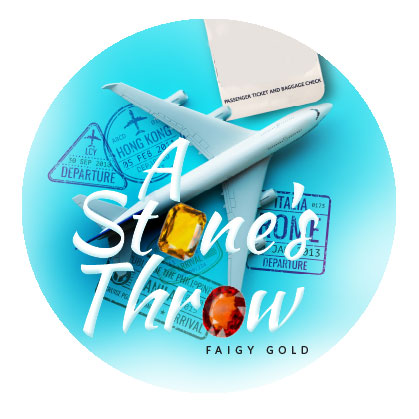A Stone’s Throw: Chapter 8


Afew years ago, my husband was in Bnei Brak, catching Minchah, when he ran into an old acquaintance, Rav Richter, who was saying Kaddish. After davening, my husband approached him, and learned that Rav Richter’s mother had been niftar a few weeks previously. Although the two men hadn’t been in touch for years, they exchanged phone numbers.
The next evening my husband got a phone call. “I don’t want you to think that I’m taking advantage,” Rav Richter said, “but meeting you yesterday was tremendous hashgachah. Something happened today and I need your advice. Would I be able to come over to your house and show you something?’
When Rav Richter showed up, I served tea and cake, and then left the room. From the amount of talking and laughing going on, it didn’t exactly sound like they were involved in business; more like they were catching up on the past 30 years. After some time, I knocked on the door to offer refills, and my husband motioned to me to sit down. It seemed he wanted to get down to business.
Rav Richter took a little velvet pouch out of his inner suit pocket, and gently emptied contents onto the table. Three sparkling diamonds rolled out. My husband raised an inquiring eyebrow.
“My parents were survivors,” his friend began to explain. “They met in Israel after the war, and married in the mid-’50s. I’m an only child — you can imagine the joy when I was born. We grew up very poor, not only because of the economic situation in Israel, but because my parents, having known real hunger and suffering, were happy with whatever they had, and had no ambition for anything more. Their cup was overflowing; they had each other, me, and Eretz Yisrael.
“As you know, they were happy and gentle parents, and our friends always loved to come over Shabbos afternoons. My father would learn with us and my mother would bring out bowls of almonds or oranges, and I never had an inkling of what kind of pain and trauma they’d been through.
“Baruch Hashem, my parents were zocheh to see Yiddishe nachas when I got married and established my family. My father was niftar two years ago and my mother just now.
“Last night, my wife and I went to start the painful job of clearing out their apartment. I opened drawers I’d never touched before. Even as a curious child, I never thought of looking there, simply because I knew my parents had nothing of value. So imagine my surprise when I found this pouch.”
We nodded, spellbound.
“My mother never wore jewelry other than her wedding band. She didn’t own a diamond ring, and I didn’t give my wife one either, because it was a luxury we couldn’t afford. And now, to find these? It was a shock... and not such a bad one either.” He smiled. “I really need the money. I need to come up with $60,000 in the next three months. So finding these diamonds was like getting a message from the Next World that my parents are still keeping an eye out for me.”
(Excerpted from Family First, Issue 593)
Oops! We could not locate your form.


